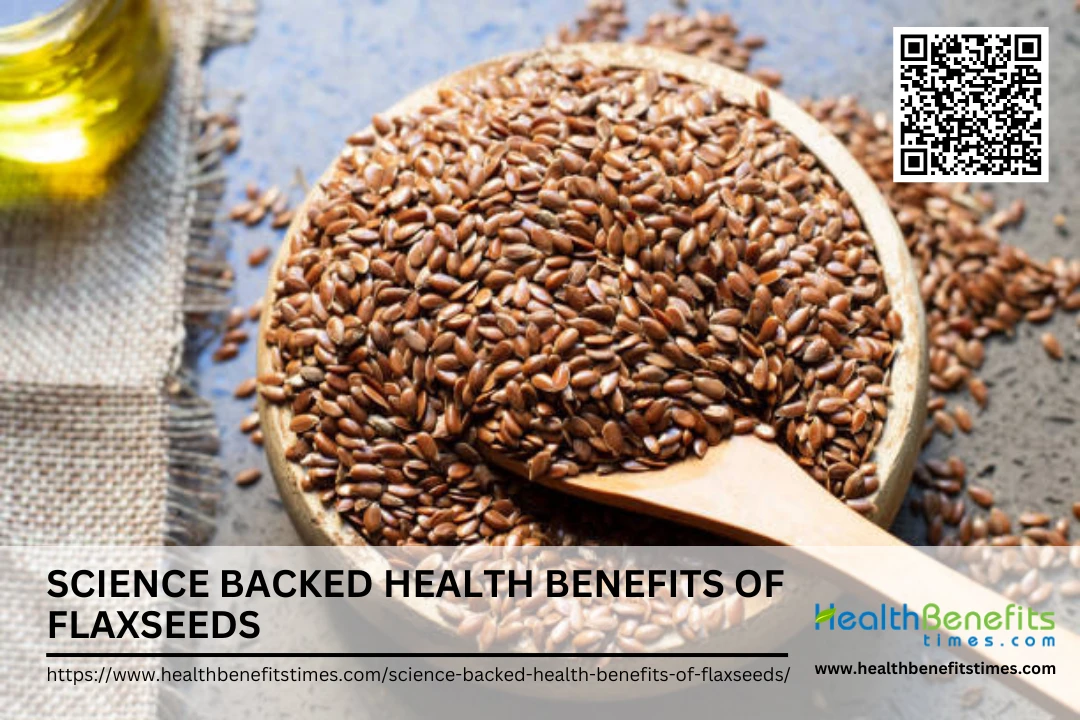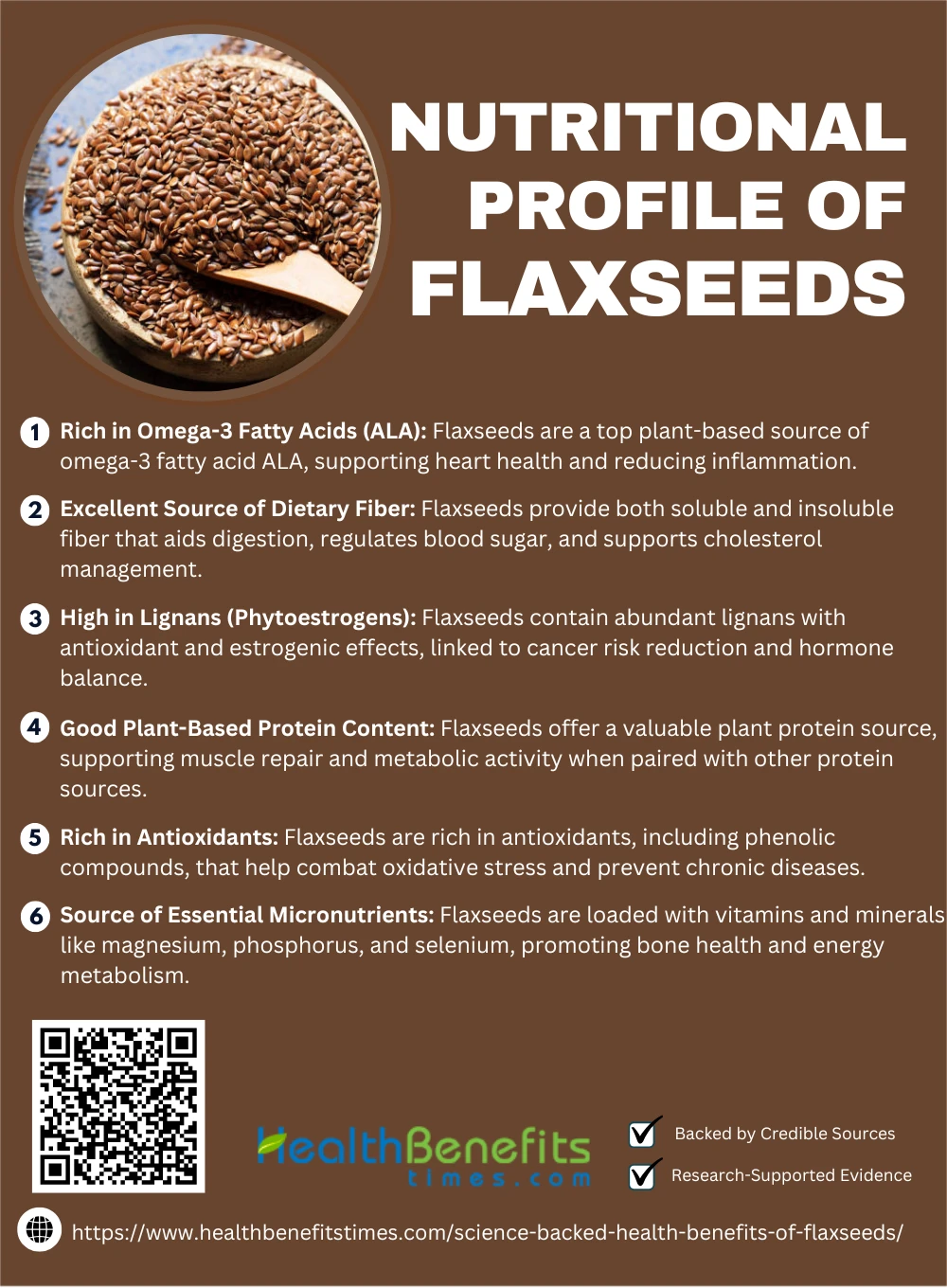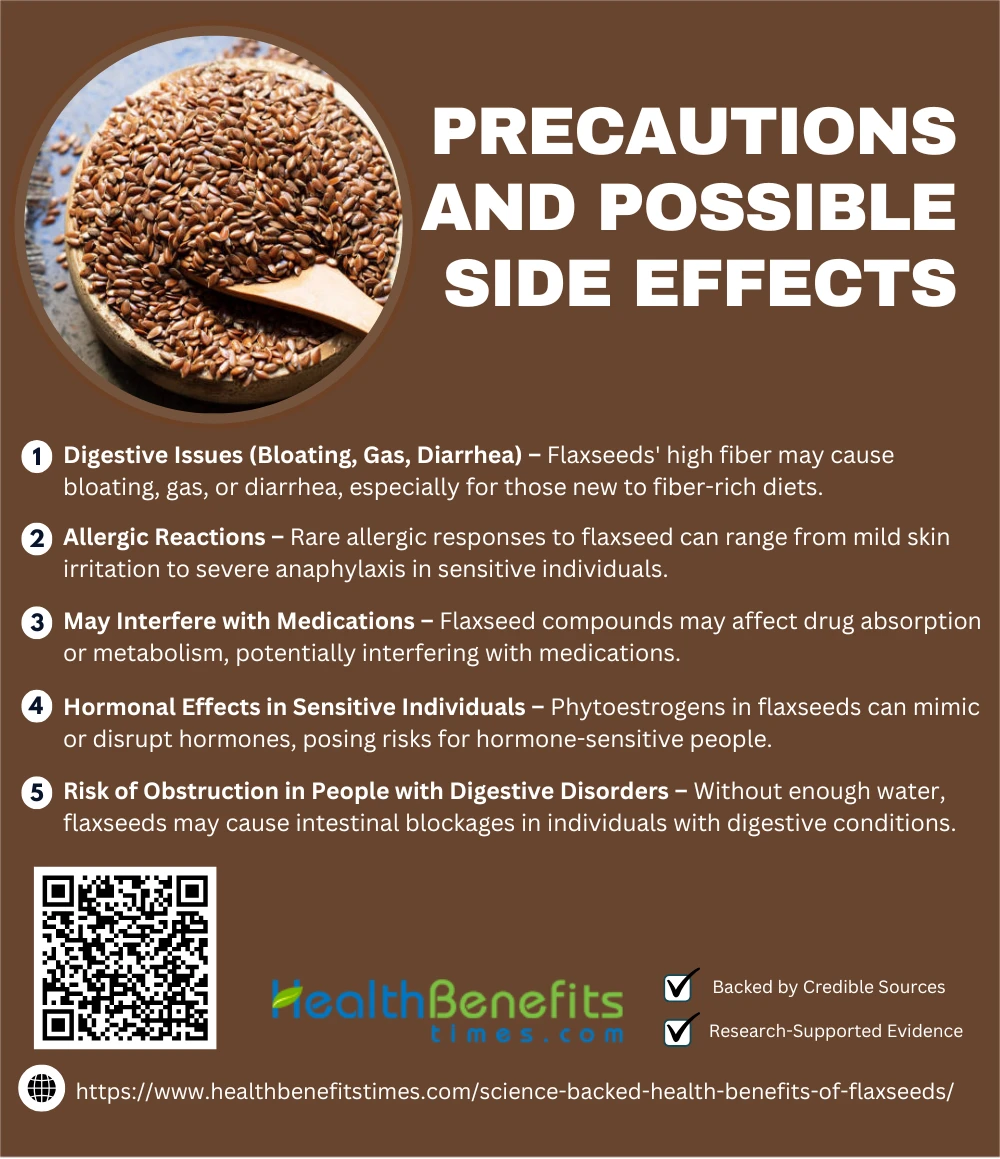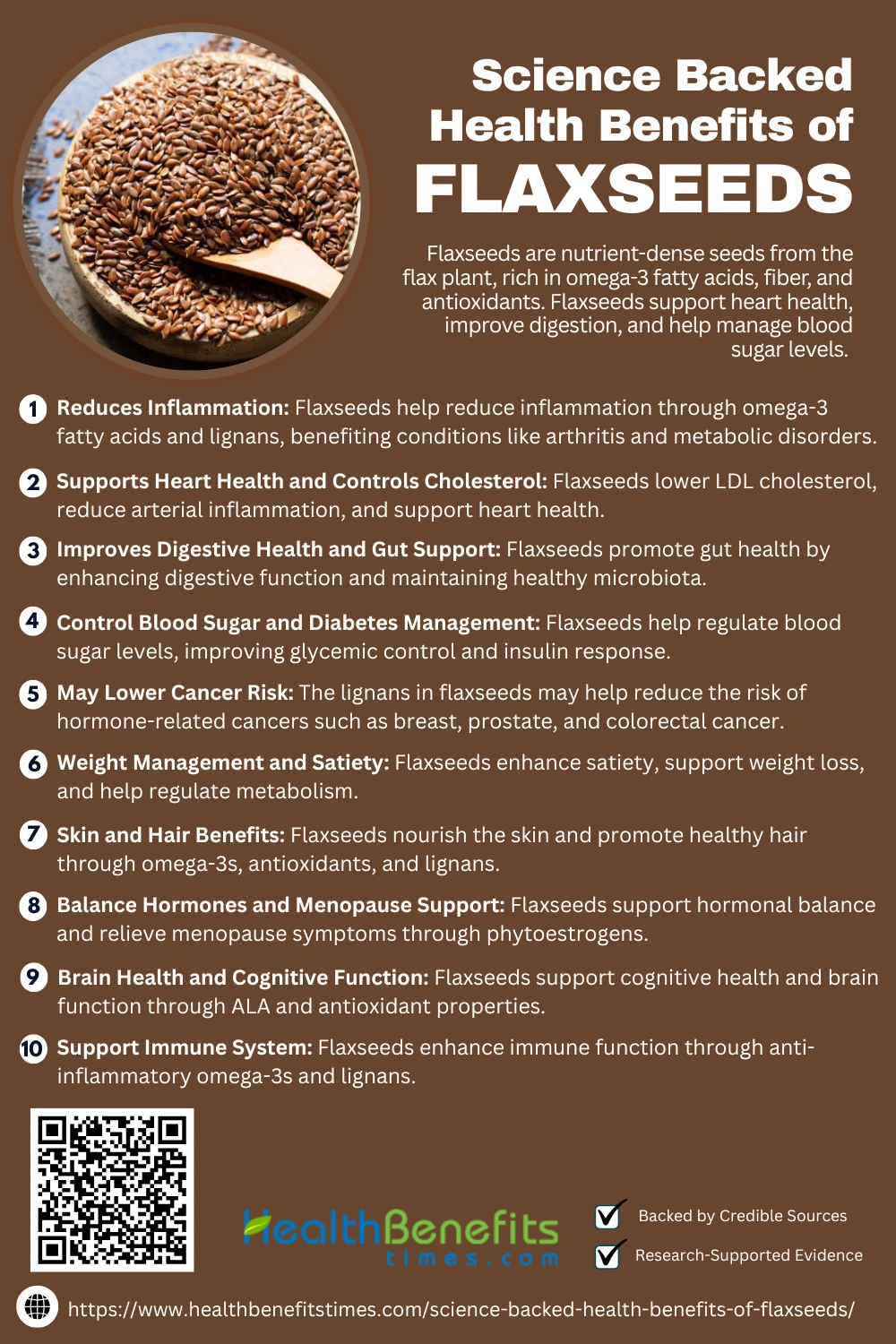- Flaxseeds are nutrient-dense seeds from the flax plant, rich in omega-3 fatty acids, fiber, and antioxidants.
- Flaxseeds support heart health, improve digestion, and help manage blood sugar levels.
- Numerous studies confirm flaxseeds’ role in preventing chronic diseases and promoting overall wellness.
 Flaxseeds (Linum usitatissimum) are small, golden or brown seeds known for their rich content of omega-3 fatty acids, lignans, and dietary fiber, making them a potent source of essential nutrients and bioactive compounds that contribute to overall wellness. Over recent decades, scientific studies have increasingly validated the therapeutic potential of flaxseeds, linking them to a wide range of health benefits including cardiovascular protection, improved digestion, hormonal balance, and reduced inflammation. Notably, flaxseeds are considered a functional food with significant impact on chronic disease prevention. In a recent comprehensive review, researchers highlighted the anti-inflammatory and cholesterol-lowering effects of flaxseed oil and components, underscoring their role in heart health and metabolic stability. Additionally, their anticancer potential has been associated with high concentrations of lignans and omega-3 fatty acids, which may inhibit tumor growth and modulate hormonal pathways. These findings firmly position flaxseeds among the top scientifically supported superfoods for preventive and therapeutic health strategies.
Flaxseeds (Linum usitatissimum) are small, golden or brown seeds known for their rich content of omega-3 fatty acids, lignans, and dietary fiber, making them a potent source of essential nutrients and bioactive compounds that contribute to overall wellness. Over recent decades, scientific studies have increasingly validated the therapeutic potential of flaxseeds, linking them to a wide range of health benefits including cardiovascular protection, improved digestion, hormonal balance, and reduced inflammation. Notably, flaxseeds are considered a functional food with significant impact on chronic disease prevention. In a recent comprehensive review, researchers highlighted the anti-inflammatory and cholesterol-lowering effects of flaxseed oil and components, underscoring their role in heart health and metabolic stability. Additionally, their anticancer potential has been associated with high concentrations of lignans and omega-3 fatty acids, which may inhibit tumor growth and modulate hormonal pathways. These findings firmly position flaxseeds among the top scientifically supported superfoods for preventive and therapeutic health strategies.
Nutritional Profile of Flaxseeds
Flaxseeds are tiny nutritional powerhouses packed with fiber, omega-3 fatty acids, lignans, and essential minerals, offering a concentrated dose of health-supporting nutrients in just a small serving.
 1. Rich in Omega-3 Fatty Acids (ALA)
1. Rich in Omega-3 Fatty Acids (ALA)
Flaxseeds are one of the most abundant plant-based sources of alpha-linolenic acid (ALA), an essential omega-3 fatty acid that plays a vital role in heart health, inflammation control, and brain function. ALA from flaxseeds has been shown to contribute to lowering the risk of cardiovascular diseases and enhancing anti-inflammatory processes in the body.
2. Excellent Source of Dietary Fiber
Flaxseeds offer both soluble and insoluble fiber, which promotes digestive health by improving gut motility and acting as a prebiotic for beneficial gut bacteria. This fiber content helps regulate blood sugar and cholesterol levels, making it beneficial for metabolic health.
3. High in Lignans (Phytoestrogens)
Lignans are plant compounds with antioxidant and estrogenic properties. Flaxseeds contain up to 800 times more lignans than other plant foods. These lignans are linked to reduced cancer risks, hormone balance, and improved metabolic profiles.
4. Good Plant-Based Protein Content
Flaxseeds are a strong source of plant-based protein, offering amino acids that support muscle repair, immune function, and metabolic activity. Though not a complete protein, when combined with legumes or grains, flaxseed protein contributes to balanced dietary intake.
5. Rich in Antioxidants
Besides lignans, flaxseeds are a source of phenolic compounds that neutralize free radicals and reduce oxidative stress. These antioxidants contribute to anti-aging, immune support, and the prevention of chronic diseases.
6. Source of Essential Micronutrients
Flaxseeds are packed with important vitamins and minerals including magnesium, phosphorus, copper, selenium, and B vitamins. These contribute to bone health, energy metabolism, and red blood cell formation.
Health Benefits of Flaxseeds
Flaxseeds offer a wide range of science-backed health benefits, including improved heart health, better digestion, hormonal balance, and disease prevention, making them a valuable addition to any balanced diet.
Flaxseeds are increasingly recognized for their ability to reduce inflammation due to their rich content of omega-3 fatty acids and lignans. Studies have demonstrated their effectiveness in mitigating inflammatory processes, particularly in conditions such as arthritis and metabolic disorders. For instance, Dayal et al. found that flaxseed oil notably improved joint health by reducing pro-inflammatory markers. In maternal studies, Tiwari et al. showed neuroprotective effects of flaxseeds. (1) Moreover, flaxseed polyphenols modulate the immune system as shown in Silva et al.. (2) A separate review by Kakarla et al. linked flax with systemic anti-inflammatory benefits. (3) Finally, Sahoo et al. highlighted flaxseed’s ability to reduce intestinal inflammation via antioxidant pathways. (4)
2. Supports Heart Health and controls Cholesterol
Flaxseeds significantly benefit cardiovascular health, particularly by lowering cholesterol and supporting heart function. Rich in alpha-linolenic acid (ALA), they reduce LDL cholesterol and arterial inflammation. Novak’s study details how flax’s fats reduce heart disease risks. (5) Dayal et al. demonstrated lowered blood pressure and cholesterol. Sahoo et al. explored how flax targets lipid pathways. (4) Additionally, Jahan et al. and Alomary et al. both reported decreased triglyceride levels linked to ALA consumption in animal and human models. (6)
3. Improves Digestive Health and Gut Support
Flaxseeds are rich in dietary fiber and mucilage, which play a key role in enhancing digestive health and supporting gut microbiota. Sahoo et al. demonstrated their ability to reduce gastrointestinal inflammation and promote intestinal repair. (4) Flaxseed gum also helps maintain probiotic viability, as shown in Li et al.. (7) Furthermore, flax’s prebiotic effects support microbial balance in the gut, according to Shrivastav et al.. (8) Research by Khodadadi et al. confirmed improved bowel function, while Abedin et al. highlighted reduced gut permeability markers. (9) (10)
4. Control Blood Sugar and Diabetes Management
Flaxseeds have been shown to effectively regulate blood sugar levels, making them a promising dietary tool for diabetes management. Their high content of soluble fiber slows glucose absorption, helping to maintain glycemic control. Sahoo et al. found flaxseed oil significantly reduced glucose spikes. (4) Shrivastav et al. linked flax to improved antioxidant and insulin response. (8) Forootan et al. observed regulatory effects on diabetic heart markers. (11) Moreover, Khodadadi et al. and Abedin et al. reported enhanced glucose tolerance and reduced insulin resistance in controlled trials. (9) (10)
5. May Lower Cancer Risk
Flaxseeds are a potent source of lignans—plant compounds known for their anti-cancer properties. These lignans may modulate hormone-related cancers such as breast and prostate cancer. In a study by Noreen et al., flaxseed intake was associated with reduced tumor growth. Aljabali et al. explored the effects of phytoestrogens in reducing cervical cancer risks. (12) A clinical trial by Josefsson et al. confirmed benefits in prostate cancer patients. Further evidence from Sahoo et al. supports colorectal cancer protection, while Singh et al. emphasized reduced risks for postmenopausal cancers. (13) (4)
6. Weight Management and Satiety
Flaxseeds contribute significantly to weight management by enhancing satiety and reducing caloric intake. Rich in soluble fiber and omega-3s, flaxseeds delay gastric emptying and suppress appetite. Wihandani et al. reported weight reduction linked to consistent flax consumption. (14) Animal studies by Silva showed increased satiety due to flaxseed polysaccharides. (15) Sahoo et al. highlighted metabolic regulation, while Noreen et al. confirmed decreased fat accumulation. (4) Additionally, Khodadadi et al. observed weight loss and improved insulin sensitivity. (9)
7. Skin and Hair Benefits
Flaxseeds are a rich source of omega-3 fatty acids, antioxidants, and lignans that nourish skin and promote healthy hair. According to Dayal et al., flaxseed oil enhances skin texture and moisture retention. (16) Hartwig et al. demonstrated skin lipid improvement in flax oil-supplemented animals. (17) Newsha Drinks emphasized flax gel’s role in hair strength. (18) Vasoya et al. recommended flax in herbal shampoos. (19) Additionally, Sahoo et al. linked flax’s antioxidants to reduced skin inflammation. (4)
8. Balance Hormones and Menopause Support
Flaxseeds naturally support hormonal balance during menopause due to their phytoestrogen content. These compounds mimic estrogen, easing symptoms like hot flashes and mood swings. Shanmugaloga and Shilpa explored flaxseeds’ role as a gentle alternative to hormone therapy. (20) Josefsson et al. found reduced tumor growth linked to flax’s hormonal modulation. (21) Singh et al. highlighted benefits in postmenopausal women. (13) Khodadadi et al. and Sahoo et al. reported improved hormonal stability and reduced menopause-related inflammation. (9) (4)
9. Brain Health and Cognitive Function
Flaxseeds enhance cognitive performance due to their rich content of alpha-linolenic acid (ALA), an essential omega-3 fatty acid that supports neural development and neurotransmission. Fathi-Achachlouei et al. demonstrated improved neurological outcomes from flaxseed-enriched dairy. Golpour-Hamedani et al. linked flax oil to better mental health scores. (22) Flax lignans also provide antioxidant support, as shown by Singh et al.. (13) Shrivastav et al. emphasized neuroprotection in diabetic models. (8) Khodadadi et al. highlighted cognition-enhancing benefits via inflammation modulation. (9)
10. Support Immune System
Flaxseeds bolster immune responses through anti-inflammatory omega-3s and lignans. Sahoo et al. showed that flax oil improves gut-linked immune pathways. (4) Bhat et al. reviewed flax’s role in autoimmune regulation. (23) Silva et al. found flax improved neonatal cytokine activity. (24) Kendamil recognized flax oil’s immune and endocrine synergy. (25) Lastly, Demystified et al. noted benefits in children’s immune development via ALA-rich flax. (26)
How to Add Flaxseeds to Your Diet
Incorporating flaxseeds into your daily meals is simple and versatile. Whether ground, whole, or as oil, they can enhance smoothies, baked goods, cereals, or salads with added nutrition.
 1. Add to Your Morning Smoothie
1. Add to Your Morning Smoothie
Adding flaxseeds to your morning smoothie is a simple way to boost brain function, heart health, and digestion. Ground flaxseeds provide essential omega-3s and fiber that blend seamlessly into fruit-based drinks. Studies show that flaxseed oil improves cellular function, and combining flax with other superfoods in smoothies enhances nutritional density, as explored by Mishra et al.. (27) Additionally, Burton’s Best supports flax as an ideal smoothie additive for daily wellness. (28)
2. Mix into Oatmeal or Porridge
Incorporating flaxseeds into oatmeal or porridge offers a seamless way to boost daily fiber and omega-3 intake. Research shows that flaxseed improves glycemic control and enhances satiety in breakfast meals. (29) Its mucilage content supports gut health, contributing to healthy digestion. (30) Regular consumption may also aid in reducing LDL cholesterol levels. (31)
3. Bake into Breads and Muffins
Baking flaxseed into muffins or bread enhances both nutrition and flavor. Studies confirm that flaxseed-fortified muffins improve antioxidant levels while maintaining taste and texture. (32) Additionally, standardized flax blends like XanFlax boost fiber content without compromising sensory appeal. (30) Clinical trials show flax muffins improve heart markers, making them a functional food. (29)
4. Use in Yogurt or Cottage Cheese
Mixing flaxseeds into yogurt or cottage cheese enhances both nutrition and gut health. Studies show that flaxseed fortification improves the lipid profile of soft cheeses. (33) It also boosts antioxidant levels in dairy products like Labneh and yogurt. (16) Furthermore, the omega-3 fatty acids in flax benefit probiotic viability in fermented dairy foods.
5. Top Off Salads
Sprinkling flaxseeds over salads adds a crunchy texture and a wealth of nutrients. Flaxseeds are a rich source of omega-3 fatty acids and lignans, known for their anti-inflammatory effects. (16) Their fiber content improves digestion and supports heart health. Moreover, cold-pressed flax oil used in dressings enhances nutrient absorption from vegetables and supports immune health when combined with raw greens. (34) (35)
6. Stir into Soups or Stews
Stirring ground flaxseeds into soups or stews is a nourishing way to enrich meals with omega-3s and fiber. Flaxseed enhances consistency while offering immune and cardiovascular support. (36) It also improves soup’s nutritional value and shelf life. (56) Additionally, flax-fortified soups demonstrate reduced glycemic impact. (38)
7. Mix with Water (Flax Drink)
Drinking flaxseed water is a hydrating method to gain mucilage fiber, aiding digestion and weight control. Studies show it enhances gut motility and improves satiety. (39) Flaxseed polysaccharides also offer anti-inflammatory effects. (15) Further, it has potential to improve nutrient absorption and support metabolic health. (40)
8. Make Flaxseed Crackers or Energy Bites
Flaxseed crackers and energy bites offer a portable and nutrient-rich way to harness flax’s omega-3s, fiber, and lignans. These snacks support cardiovascular health and weight control Majhi et al., 2024, aid in digestion De, 2020, and regulate cholesterol Katoch et al., 2016. (41) (36) (42) Homemade bites ensure minimal processing and additive control.
9. Add to Rice or Grain Bowls
Sprinkling ground flaxseeds over rice or grain bowls enhances both texture and nutrition. This combination boosts fiber and omega-3 intake De, 2020, supports heart health Majhi et al., 2024, and fortifies meals with antioxidants Katoch et al., 2016. (36) (42) (41) This is an effortless upgrade to everyday meals.
10. Blend into Pancake or Waffle Batter
Blending flaxseeds into pancake or waffle batter is a delicious way to enrich breakfast with fiber, omega-3s, and lignans. Flax-enhanced mixes improve heart health and antioxidant activity, as noted by Wilkes (2007). (43) Their nutty flavor pairs well with whole grains, promoting nutrient absorption Mishra et al., 2019. (44) Additionally, flaxseed increases the nutritional value of gluten-free batters Stoican et al., 2021. (45)
Precautions and Possible Side Effects
While flaxseeds offer many health benefits, they may cause side effects like bloating or interact with medications. It’s important to consume them in moderation and consult your doctor if needed.
 1. Digestive Issues (Bloating, Gas, Diarrhea)
1. Digestive Issues (Bloating, Gas, Diarrhea)
Although flaxseed is praised for its health benefits, it may trigger digestive issues such as bloating, gas, and diarrhea in some individuals. High fiber content can cause gastrointestinal discomfort, especially in those unaccustomed to fiber-rich diets, as noted in a review on flaxseed’s multifunctional role. A clinical overview emphasized that flaxseed consumption may increase abdominal distention and flatulence, contributing to non-compliance in dietary regimens. Similarly, a study on flaxseed’s impact on gut function reported episodes of diarrhea and emphasized gradual dietary introduction to minimize adverse effects (NIH Review, 2023). (46) These findings suggest cautious incorporation, especially for sensitive digestive systems.
2. Allergic Reactions
Though rare, flaxseed can cause allergic reactions ranging from mild skin irritation to severe anaphylaxis. Clinical observations highlight symptoms such as itching, swelling, and shortness of breath, particularly among sensitive individuals, as discussed in this study on herbal formulations. (47) Immunological cross-reactivity may also be triggered by flax proteins (source 2). (48) A broader toxicological profile of flaxseed’s allergens is documented in Basch et al.’s integrative review. (49)
3. May Interfere with Medications
Flaxseed contains lignans and fibers that may alter drug absorption or metabolism, posing interaction risks. Hawsawi (2018) demonstrated potential hepatic interference with statin metabolism in a University of Saskatchewan thesis. (50) Mukker (2013) emphasized metabolic pathway competition in his pharmacokinetic studies. (51) Furthermore, the inhibition of drug-metabolizing enzymes by flaxseed compounds is discussed in a 2019 MDPI review. (52)
4. Hormonal Effects in Sensitive Individuals
Flaxseeds are rich in phytoestrogens, particularly lignans, which can mimic or block estrogen in the body, raising concerns for hormone-sensitive individuals. A recent review in Phytomedicine Plus explores these endocrine-modulating effects. (12) Hormonal shifts in estrogen-sensitive populations are especially concerning due to lignan metabolism, as discussed in Basch et al.’s report. (49) Another study highlights variability in individual metabolic responses to flax lignans, raising implications for breast cancer patients. (48)
5. Risk of Obstruction in People with Digestive Disorders
Due to their bulk-forming fibers, flaxseeds can pose a risk of gastrointestinal blockage, particularly in those with pre-existing digestive conditions. High intake without adequate hydration may worsen obstructions, as detailed in this flaxseed review. (53) A study on flax in cystic fibrosis patients noted intensified GI symptoms and blockage potential. (54) Additional data from Nutrients journal suggest that soluble fiber can increase gut viscosity, potentially contributing to complications. (55)
Conclusion
Flaxseeds are a powerful superfood, offering a wide range of health benefits supported by scientific research. From supporting heart health and improving digestion to managing blood sugar levels and fighting cancer, these tiny seeds pack a punch in terms of nutritional value. They provide essential omega-3 fatty acids, fiber, and antioxidants, which contribute to overall well-being. By including flaxseeds in your diet, you can enhance skin health, promote weight management, and even support hormonal balance. However, like any food, moderation is key, and it’s always best to consult with a healthcare professional before making significant dietary changes.


